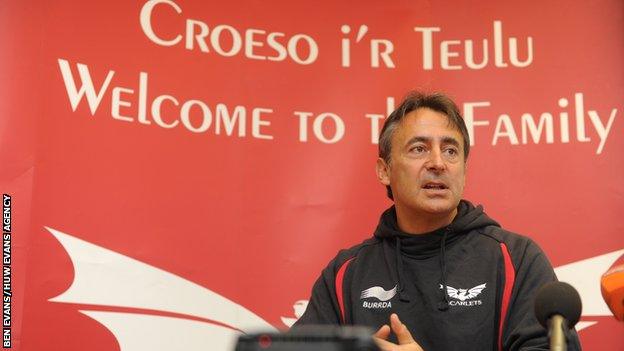Nigel Davies: We must admit there's a problem with Welsh rugby, says ex-coach
- Published

Nigel Davies has been head coach at Scarlets and also Wales caretaker coach
Former Wales captain Nigel Davies says the vulnerability of the community game is the main driving force behind his bid to win a seat on the Welsh Rugby Union national council.
Davies is one of three nominated candidates alongside Ieuan Evans and John Manders.
WRU member clubs have until 10 July to vote for their preferred candidate.
"A recent audit has identified that player numbers are dwindling quite frighteningly," Davies said.
"We have to stick our hand up as a union and say we've got a problem. The community game is not healthy, it's the most vulnerable part of our game.
"A lot of people are telling me they feel disengaged. I'm a passionate believer that the community game is the bedrock of our game in Wales. If we lose that, we'll lose a massive part of our identity."
Davies represented Wales and the former centre was appointed Wales head coach in 2007 before holding the same role at Scarlets for four years.
Despite publicly criticising the WRU in the past, Davies now wants a seat at the table in order to enforce change.
Pooling resources with other sports and developing a closer link with professional players are some of Davies' suggestions.
As the current Merthyr RFC chief executive, he also wants to see changes at both a semi-professional and regional level, which includes using the Welsh Premiership as a development tool:
"The game has changed. Professional teams have been carrying squads of up to 60 players," he told BBC Sport Wales.
"Are they going to do that after the crisis? I doubt it. They have to play somewhere and develop somewhere and that's where it needs to happen in the Premiership."
Many of those professional players are currently in pay-cut discussions with the WRU, which Davies feels is an inevitable reality.
'If you're dealing with players and talking about cost reductions, you have to be really clear and transparent with those players in terms of saving the long term future of the region," he said.
"It won't be easy and there's a bumpy road ahead."